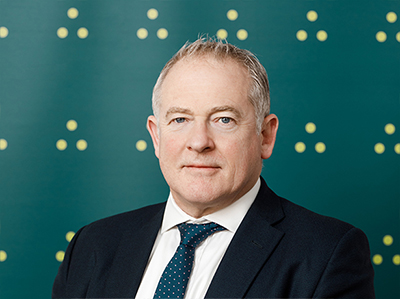Estimates suggest that over the next thirty years, a record £5.5 trillion is predicted to be transferred between ‘baby boomers’ (the generation of individuals born roughly between 1946 – 1964) to ‘millennials’ (those born between 1981 – 1996), as either inheritance or gifts.
Often dubbed as the ‘’Great Wealth Transfer’’, this trend is currently a key area of focus for those working in the wealth management sector around the world.
With shifting demographics and changing customer behaviours, it’s clear that the Great Wealth Transfer provides both opportunities and threats for those in the financial industry.
In this article, FCM’s Managing Director, John Wood, provides insight into how wealth managers, especially those who work in family offices, can prepare and capitalise on the Great Wealth Transfer.
Changing client demographics
It’s no doubt that we’re at a turning point in the sustainability and environmental, social and governance (ESG) agenda with organisations and individuals around the world demonstrating their commitment to the cause. From in-house staff, consumers and investors, most people now expect a company to be actively addressing ESG priorities and opportunities.
Although interest in ESG investing is significant across all ages, it’s the younger generations that are leading the trend. As a result, the wealth transfer could significantly change spending habits and result in an increase in ESG investing.
The Prudential’s Family Wealth Unlocked report emphasised that the appetite for sustainable investments is growing, especially amongst young people. It found that 52% of millennials and 57% of Gen X all confirm a significant increase to invest sustainably, unlike 38% of the 54–74-year-old boomer group.
With this being said, firms must take tangible action to incorporate ESG into their business models if they hope to remain relevant to their future clients and stakeholders, and to also stay ahead of competitors. Not only this, but wealth managers must also pay greater attention to the development of ethical products and solutions that appropriately meet the expectations and requirements of younger clients.
However, it’s important to remember that every person is different and may hold contrasting beliefs to their family members. If you work in a family office for example, to really understand the values and attitudes of the client, wealth managers should firstly seek to know what drives their decision-making process, such as ESG or sustainable investing.
The best way to do this is by simply asking what matters most to them. From here, wealth managers become a vital component in helping their younger client find suitable and ethical solutions that reflect their values. It also opens conversations with the client and highlights that they generally care about their interests and beliefs.
Bridging the gap in knowledge
For some, suddenly having access to a large amount of money, and not knowing what to do with it, can be overwhelming. Therefore, it’s important that the next generation of beneficiaries are equipped with the financial knowledge to deal with the assets that they stand to inherit.
So how can wealth managers bridge the gap in knowledge?
Many institutions, including family offices, may already have the financial literacy and education offering for their clients, therefore they ought to make these resources available to the younger generation of customers.
Family offices can offer training programmes or bespoke sessions where they talk them through basic financial foundations, as well as topics related to inheritance. Advisors can also provide opportunities for beneficiaries to visit their institutions and spend time building their knowledge of business leadership or the investment market. This is also a great way to build a relationship with an individual.
Tapping into technology
As the next generation of beneficiaries will be the first to have grown up with the presence of digital technology, wealth managers must be quick to embrace it.
Younger generations are more likely to research and move wealth management firms if not satisfied, with studies suggesting that at least 80% of millennial heirs will seek out a new financial advisor after inheriting their parents’ wealth. Therefore, it’s important for wealth managers to stay ahead of the game and their competitors, especially in terms of technology.
Embracing technological innovations, such as mobile applications, robo-advisors, and other digital tools and channels can help to improve efficiency and diversify means of communication, engagement and support with current and potential customers. At FCM we have been in the “paperless” world for over 5 years and continue to utilise FinTech as much as practicable without compromising on client service – only to enhance it.
Already, family offices across the globe are utilising technology to become more cost-effective and efficient. Embracing technology can provide transparency, offer stronger analytics and improve reporting. Digital applications can also help advisors with tracking and managing risks across their portfolio of investments.
Despite its benefits, it’s important to remember that humans offer what technology cannot. Robo-advice for example, while efficient and cost-effective, cannot help clients sort through personal issues or the wave of emotions felt by someone who is financially planning after a parent’s death. Face-to-face communication is still key to getting to know your customers, understanding what they want and building trust with them. This can help to form long-lasting relationships and loyal customers.
Looking to the future
It’s clear that today’s wealth manager needs to work smarter and faster to win the heart and mind of the next generation of clients.
However, with an unprecedented amount of wealth set to be transferred between generations, advisors have a huge responsibility to ensure that this is done in a gradual, educated and efficient manner. Family offices can be key to unlocking barriers and ease the process of transferring wealth to the next generation of beneficiaries.
At FCM, we seek to provide an excellent and personable experience for our clients – including the future generations. With 25 years’ experience in the industry, family office work is one of our specialities. Over this period, we’ve already handled one generation of wealth transfers, and many of our clients today are the third generation of their family to have entrusted us with their wealth.
By engaging an experienced specialist, clients can be assured of the ongoing effectiveness of their structures, protecting and managing wealth for future generations.
To find out more about FCM and its family office services, please visit: www.fcmtrust.com/family-office/

